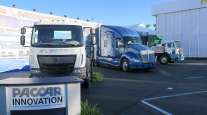Senior Reporter
Daimler, Cummins and Paccar Partner on EV Battery Plant

[Stay on top of transportation news: Get TTNews in your inbox.]
Accelera by Cummins, Daimler Truck Holding and Paccar are forming a joint venture to build a U.S. factory that will produce battery cells for electric commercial vehicles and industrial applications, a move the companies said will create domestic manufacturing jobs and accelerate development of electric vehicle battery production while also helping them advance their long-term climate goals.
“We have the responsibility to decarbonize in a way that is best for all of our stakeholders and the planet,” Cummins Chair and CEO Jennifer Rumsey said in a statement. “This requires working closely with key partners. Today’s announcement reflects that action. Not only are we advancing a key technology solution for our customers, but accelerating the energy transition in the United States.”
Construction of the planned 21-gigawatt hour factory carries an estimated cost of $2 billion to $3 billion. A location for the plant has not been announced.
In all, four companies are involved in the project. Accelera by Cummins — the engine maker’s zero-emission business unit — along with truck manufacturers Daimler and Paccar will each own a 30% share of the venture, and the other 10% will be owned by Eve Energy Co. That company will serve as a technology partner and contribute battery cell design and manufacturing expertise.
“For Daimler Truck, partnerships and a strict focus on costs and smart capital allocation are the key levers to succeed on the path toward sustainable transportation,” Daimler CEO Martin Daum said. “This planned joint venture enables economies of scale beyond Daimler Truck. It is a key puzzle piece of our battery industrialization strategy, ensuring access to the right battery cell technology at the right cost.” Daimler builds Freightliner and Western Star trucks.
Said Paccar CEO Preston Feight: “Our vision is the highest quality, locally produced battery technology to enhance the operations of our customers and help them achieve their operational and environmental goals.”
🔋 @AcceleraZero, #DaimlerTruck & #PACCAR form joint venture to advance battery cell production in the U.S. #JointVenture to manufacture #battery cells for electric #CommercialVehicles. Investment: $2-3 bn. @EVE_LITHIUM to serve as technology partner.
👉: https://t.co/B2zYjByaBN pic.twitter.com/zbj5GTGtiZ — Daimler Truck AG (@DaimlerTruck) September 6, 2023
The four companies say initially the process will focus on lithium-iron-phosphate battery technology for commercial battery-electric trucks. Paccar is the parent of the Kenworth and Peterbilt truck brands.
Eve Energy, based in China, is principally engaged in the development, manufacture and distribution of battery products. According to Globaldata.com, its 2022 net revenue was $5.4 billion, an increase of 112% from the previous year. The company is publicly traded on the Shenzhen stock exchange. The company has a U.S. sales office in the Columbus, Ohio, area, and its website shows production testing being done on lithium-iron-phosphate cells.
At least one industry analyst said the size of the proposed battery factory is staggering.
“On a scale of one to 10, this announcement is about an eight,” said Jamie Fox, principal analyst with Interact Analysis, a U.K.-based market research firm. Fox said a 21-gigawatt hour plant operating at full capacity could provide significant battery capacity in a few short years.

Transport Topics' Seth Clevenger, Michael Freeze and Mike Senatore dissect the new Top 100 list of the largest private carriers, including how fleets are adapting to this softened market. Tune in above or by going to RoadSigns.ttnews.com.
“If they can get this facility up and running by 2026, they’ll be producing all the batteries needed for all the buses and trucks in the U.S.,” he said, pointing specifically to heavy- and medium-duty trucks as well as electric buses, assuming a combined market share of about 10% by then. “It’s going to be a significant market share.”
Fox also noted that there are financial incentives that could propel the project. “They’ll be looking to benefit from the subsidies also in the Inflation Reduction Act, which was set up to benefit U.S. manufacturing,” he said.
By 2028, that same plant could produce enough battery power for 40% of the electrics trucks on the road, assuming the market share grows from 10% to 22% by that year.
Fox noted that the partnership will likely need approval of the Committee on Foreign Investment in the United States for any conflict with national security.
The battery production deal follows a wave of joint ventures that feature these and other participants.
In 2021 Daimler and Volvo launched Cellcentric, a 50-50 initiative to develop fuel cell technology. At the time, the companies set a goal of launching customer testing of fuel cell trucks by the middle of this decade and to launch production during the second half of the decade. They noted, however, that they would remain competitors in all vehicle and product ranges and particularly in fuel cell integration solutions for vehicles.
Paccar Inc. and global automaker Toyota Motor Corp. are likewise moving forward on a partnership to produce fuel cell electric Class 8 trucks for the North American market.
Earlier this year, Daimler merged its Japanese medium-duty Mitsubishi Fuso Truck and Bus Corp. unit with Hino Motors as part of an effort to accelerate the development of advanced technologies.
Want more news? Listen to today's daily briefing below or go here for more info:




